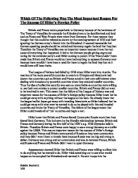Rafaella Rique, 8D
Hitler’s Foreign Policy
When Hitler came to power in Germany in 1933 one rather important event took place in his life, he was appointed Chancellor. Hindenburg and Von Papen were the ones that gave him this post because they thought and were confident that by this, they would limit Hitler’s influence in people and resist his extremist demands. But by this time Hitler had a lot of power and no one was able to control him. He was very ambitious and had a very powerful way of speaking making wonderful and effective speeches mentioning that Germany lacked a strong leader. Through this, Hitler managed to get everyone’s attention and everyone knew he was aiming for the country to get revenge from Germany’s defeat in the war and that he was an anti-communist.
One of his main focuses was to abolish the Treaty of Versailles’s because he thought the unfairness and the punishments implied on Germany were totally unacceptable. Due to that he invaded the Rhineland in 1936 which was a German area demilitarized by the Treaty of Versailles. During this, Hitler took notice that Britain and France weren’t ready to challenge him because they didn’t intervene when Hitler’s army entered the area. Expand the German territory was also one of his main aims. He wanted to take over all the German territories that were affected by the Treaty of Versailles such as the Sudetenland in 1938. The Sudetenland was a Czech area bordering with Germany but with a German population living in it.
In the 1930’s there were two incidents that really tested the League of Nations. In the beginning of 1930’s, Communism was the concern for almost everyone so nearly everyone left Hitler as a second alarm, being blind for his true threat for Europe. However the USSR opened their eyes when they saw Hitler rising to rule and becoming powerful but there wasn’t much they could do because they couldn’t see Britain and France intervening, so they were also afraid. Nevertheless, Britain, France and Italy were occupied holding a conference with one of the aims of making the Locarno agreements, which was a reinforcement of the Treaty of Versailles, respected. Therefore this showed that they actually had concern and awareness about Hitler’s intentions and ambitions. Right after in 1931 there was a blow on the League of Nations when the Japanese army took over invading and setting up a military dictatorship in Manchuria. Then, in 1936 Mussolini, the Italian dictator, invaded Abyssinia located in Africa because he wanted to built an empire. His actions were also with the purpose of challenging the League. These two invasions were badly handled by the League since they didn’t know what procedures to take immediately. Consequently delaying their actions letting time pass by whilst the Japanese expanding their occupation of Chinese territory. The League showed no follow up on making the Japanese leave which overall increased people’s discredit in the League because everyone was looking forward to it and it didn’t take any actions. During all these events, Hitler was planning his future actions calmly with no intervention of anyone. The League, mainly Britain and France which were the founder members was then already messed up, afraid of taking any other wrong decisions again. So they preferred to ignore Hitler’s plans and actions.







